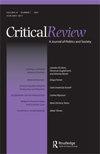Repoliticizing Environmentalism: Beyond Technocracy and Populism
IF 1.7
3区 社会学
Q4 POLITICAL SCIENCE
引用次数: 3
Abstract
ABSTRACT The mainstreaming of environmental concerns paradoxically obscures their political dimension: as the goals of environmentalism become accepted, they are reduced to administrative problems to be solved in a purely technocratic way. This technocratic environmentalism has fueled a populist backlash that challenges the scientific basis of environmentalism. As a result, contemporary environmentalism appears to be stuck in a depoliticizing opposition between technocracy and populism. A possible way out of this depoliticizing trap consists in recognizing the intrinsic contestability of the core premises on which environmentalism is based, since it is not merely the result of a straightforward application of scientifically provable facts, but also depends on normative principles and value choices. This opens the possibility for an internal pluralization of environmentalism, which shifts emphasis from the depoliticizing struggle between technocratic environmentalism and populist anti-environmentalism to the inherently political rivalry between different types of environmentalism.环境保护主义的再政治化:超越技术官僚和民粹主义
环境问题的主流化矛盾地模糊了其政治维度:随着环境保护主义的目标被接受,它们被简化为以纯粹技术官僚的方式解决的行政问题。这种技术官僚式的环保主义引发了民粹主义的反弹,挑战了环保主义的科学基础。因此,当代环境保护主义似乎陷入了技术官僚与民粹主义的非政治化对立之中。走出这种去政治化陷阱的一个可能的方法是,认识到环境保护主义所基于的核心前提的内在可争议性,因为它不仅仅是直接应用科学可证明的事实的结果,而且还取决于规范性原则和价值选择。这为环境保护主义的内部多元化打开了可能性,它将重点从技术官僚环境保护主义和民粹主义反环境保护主义之间的非政治化斗争转移到不同类型环境保护主义之间内在的政治竞争。
本文章由计算机程序翻译,如有差异,请以英文原文为准。
求助全文
约1分钟内获得全文
求助全文
来源期刊

Critical Review
POLITICAL SCIENCE-
CiteScore
1.30
自引率
12.50%
发文量
17
期刊介绍:
Critical Review: A Journal of Politics and Society is a political-science journal dedicated to advancing political theory with an epistemological bent. Recurrent questions discussed in our pages include: How can political actors know what they need to know to effect positive social change? What are the sources of political actors’ beliefs? Are these sources reliable? Critical Review is the only journal in which the ideational determinants of political behavior are investigated empirically as well as being assessed for their normative implications. Thus, while normative political theorists are the main contributors to Critical Review, we also publish scholarship on the realities of public opinion, the media, technocratic decision making, ideological reasoning, and other empirical phenomena.
 求助内容:
求助内容: 应助结果提醒方式:
应助结果提醒方式:


